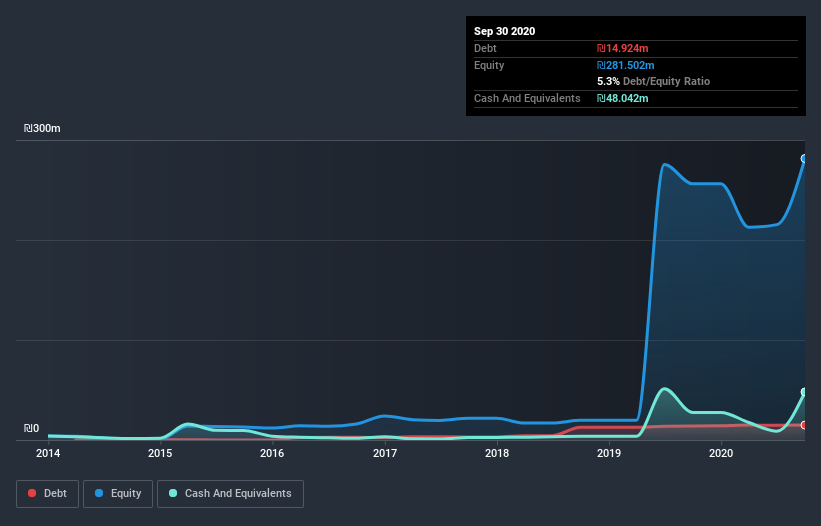Howard Marks put it nicely when he said that, rather than worrying about share price volatility, 'The possibility of permanent loss is the risk I worry about... and every practical investor I know worries about.' When we think about how risky a company is, we always like to look at its use of debt, since debt overload can lead to ruin. We can see that InterCure Ltd. (TLV:INCR) does use debt in its business. But should shareholders be worried about its use of debt?
What Risk Does Debt Bring?
Debt assists a business until the business has trouble paying it off, either with new capital or with free cash flow. Part and parcel of capitalism is the process of 'creative destruction' where failed businesses are mercilessly liquidated by their bankers. However, a more frequent (but still costly) occurrence is where a company must issue shares at bargain-basement prices, permanently diluting shareholders, just to shore up its balance sheet. Of course, the upside of debt is that it often represents cheap capital, especially when it replaces dilution in a company with the ability to reinvest at high rates of return. When we think about a company's use of debt, we first look at cash and debt together.
View our latest analysis for InterCure
What Is InterCure's Debt?
As you can see below, at the end of September 2020, InterCure had ₪14.9m of debt, up from ₪14.3m a year ago. Click the image for more detail. But on the other hand it also has ₪48.0m in cash, leading to a ₪33.1m net cash position.

How Healthy Is InterCure's Balance Sheet?
The latest balance sheet data shows that InterCure had liabilities of ₪35.2m due within a year, and liabilities of ₪4.18m falling due after that. Offsetting this, it had ₪48.0m in cash and ₪16.3m in receivables that were due within 12 months. So it actually has ₪25.0m more liquid assets than total liabilities.
This surplus suggests that InterCure has a conservative balance sheet, and could probably eliminate its debt without much difficulty. Simply put, the fact that InterCure has more cash than debt is arguably a good indication that it can manage its debt safely. When analysing debt levels, the balance sheet is the obvious place to start. But it is InterCure's earnings that will influence how the balance sheet holds up in the future. So when considering debt, it's definitely worth looking at the earnings trend. Click here for an interactive snapshot.
In the last year InterCure managed to produce its first revenue as a listed company, but given the lack of profit, shareholders will no doubt be hoping to see some strong increases.
So How Risky Is InterCure?
By their very nature companies that are losing money are more risky than those with a long history of profitability. And in the last year InterCure had an earnings before interest and tax (EBIT) loss, truth be told. Indeed, in that time it burnt through ₪25m of cash and made a loss of ₪60m. With only ₪33.1m on the balance sheet, it would appear that its going to need to raise capital again soon. The good news for shareholders is that InterCure has dazzling revenue growth, so there's a very good chance it can boost its free cash flow in the years to come. While unprofitable companies can be risky, they can also grow hard and fast in those pre-profit years. There's no doubt that we learn most about debt from the balance sheet. But ultimately, every company can contain risks that exist outside of the balance sheet. For instance, we've identified 3 warning signs for InterCure (2 don't sit too well with us) you should be aware of.
If you're interested in investing in businesses that can grow profits without the burden of debt, then check out this free list of growing businesses that have net cash on the balance sheet.
If you decide to trade InterCure, use the lowest-cost* platform that is rated #1 Overall by Barron’s, Interactive Brokers. Trade stocks, options, futures, forex, bonds and funds on 135 markets, all from a single integrated account. Promoted
New: AI Stock Screener & Alerts
Our new AI Stock Screener scans the market every day to uncover opportunities.
• Dividend Powerhouses (3%+ Yield)
• Undervalued Small Caps with Insider Buying
• High growth Tech and AI Companies
Or build your own from over 50 metrics.
This article by Simply Wall St is general in nature. It does not constitute a recommendation to buy or sell any stock, and does not take account of your objectives, or your financial situation. We aim to bring you long-term focused analysis driven by fundamental data. Note that our analysis may not factor in the latest price-sensitive company announcements or qualitative material. Simply Wall St has no position in any stocks mentioned.
*Interactive Brokers Rated Lowest Cost Broker by StockBrokers.com Annual Online Review 2020
Have feedback on this article? Concerned about the content? Get in touch with us directly. Alternatively, email editorial-team@simplywallst.com.
About TASE:INCR
InterCure
Engages in the research, cultivation, production, marketing, and distribution of pharmaceutical-grade cannabis and cannabis-based products for medical use in Israel and internationally.
Mediocre balance sheet and slightly overvalued.
Similar Companies
Market Insights
Community Narratives




